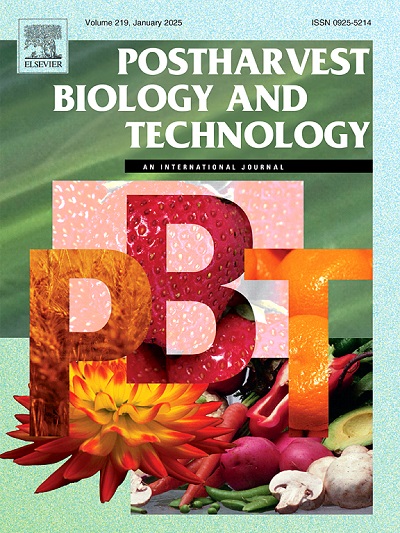Combined physiological, biochemical, and multi-omic analyses provide insight into the cause of differential browning in early and late harvested fresh-cut yams
IF 6.4
1区 农林科学
Q1 AGRONOMY
引用次数: 0
Abstract
Tissue browning reduces the cosmetic quality of fresh-cut yams and poses a marketing problem. The degree of browning of fresh-cut yams varies depending on when they are harvested. In this study, transcriptomic and metabolomic analyses were conducted in yams harvested in September (DHPS) and October (DHPO) to determine the mechanisms responsible for the browning of fresh-cut yams. Results showed that the browning index, total phenol and lignin content, polyphenol oxidase (PPO), peroxidase (POD), phenylalanine ammonia-lyase (PAL), 4-coumarate: CoA Ligase(4CL), and cinnamic acid-4-hydroxylase(C4H) activity in fresh-cut DHPO yams were lower than they were in fresh-cut DHPS yams. Flavonoids and catalase (CAT) activity remained consistently higher during storage in DHPO yams than in DHPS yams. The browning of fresh-cut DHPO yams was mitigated by the regulation of the expression of genes and the abundance of metabolites associated with phenolic metabolism, phytohormones, and signal transduction, as well as sucrose and starch metabolism. The level of browning enzyme activity in DHPO yams was significantly lower than it was in DHPS yams. Our study provides a basis for the selection of optimum harvest date for yams that will undergo fresh-cut processing.
综合生理、生化和多组学分析,深入了解早收和晚收鲜切山药不同褐变的原因
组织褐变会降低鲜切山药的外观质量,并带来销售问题。鲜切山药的褐变程度因收获时间而异。本研究对 9 月(DHPS)和 10 月(DHPO)收获的山药进行了转录组和代谢组分析,以确定导致鲜切山药褐变的机制。结果表明,褐变指数、总酚和木质素含量、多酚氧化酶(PPO)、过氧化物酶(POD)、苯丙氨酸氨解酶(PAL)、4-香豆酸:CoA连接酶(4CL)和肉桂酸-4-羟化酶(C4H)的活性均低于鲜切 DHPO 山药。在贮藏期间,DHPO 山药的类黄酮和过氧化氢酶(CAT)活性始终高于 DHPS 山药。与酚类代谢、植物激素、信号转导以及蔗糖和淀粉代谢有关的基因表达和代谢产物的丰度调节减轻了鲜切 DHPO 山药的褐变。DHPO山药的褐变酶活性水平明显低于DHPS山药。我们的研究为选择山药鲜切加工的最佳收获期提供了依据。
本文章由计算机程序翻译,如有差异,请以英文原文为准。
求助全文
约1分钟内获得全文
求助全文
来源期刊

Postharvest Biology and Technology
农林科学-农艺学
CiteScore
12.00
自引率
11.40%
发文量
309
审稿时长
38 days
期刊介绍:
The journal is devoted exclusively to the publication of original papers, review articles and frontiers articles on biological and technological postharvest research. This includes the areas of postharvest storage, treatments and underpinning mechanisms, quality evaluation, packaging, handling and distribution of fresh horticultural crops including fruit, vegetables, flowers and nuts, but excluding grains, seeds and forages.
Papers reporting novel insights from fundamental and interdisciplinary research will be particularly encouraged. These disciplines include systems biology, bioinformatics, entomology, plant physiology, plant pathology, (bio)chemistry, engineering, modelling, and technologies for nondestructive testing.
Manuscripts on fresh food crops that will be further processed after postharvest storage, or on food processes beyond refrigeration, packaging and minimal processing will not be considered.
 求助内容:
求助内容: 应助结果提醒方式:
应助结果提醒方式:


